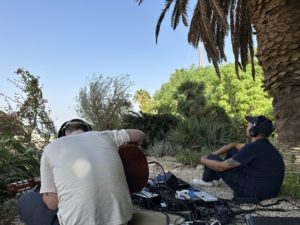How Does Music Affect Your Mood and Wellness?
Music has been used for centuries to evoke emotions, bring people together, and even aid healing. But, just what is it about music that has such a profound effect on our mood and wellness? Is the impact of music universal, or does it vary depending on region or culture? Here, we’ll explore the growing body of research on how music affects wellness, and how Myndstream is using music to help individuals and businesses improve their overall wellbeing.

The Soundtrack of Wellness: What the Research Tells Us
The power of music on our health and wellbeing has been extensively studied, with numerous research findings highlighting the positive benefits of listening to (and playing) music. At a fundamental level, for example, research tells us that listening to music can have a calming and relaxing effect on our bodies, by reducing cortisol levels (the human stress hormone) and lowering our heart rate.
Moreover, a large-scale review of 400 studies found that playing and listening to music has a positive impact on our immune system, reducing stress levels, and promoting social bonding. Music has also been found to alleviate anxiety, lower blood pressure, relieve pain, and noticeably improve sleep quality, mood, mental alertness, and memory; it’s quite amazing how the simple act of listening to music can have such a profound effect on our overall wellbeing.
Neuroscientists have even discovered that listening to music stimulates the release of good old dopamine, a neurotransmitter in our brain’s reward centres that helps to churn out positive emotions. A boost in dopamine can elicit feelings of pleasure and even elation, so there’s no wonder we routinely use music as a method for cheering up and more.
Pivotal research findings in relation to the immense potential that music has for improving mental (and therefore physical) wellness has recently sprung from a review of 26 studies; these studies all demonstrate that music affects mental health in a positive way, in a similar way that exercise and weight loss can.
Exploring the Global Use of Music for Wellness
So, the evidence clearly demonstrates the positive effects that music can have on wellness and for mental health patients, but is this a universal truth, and how do preferences and practices differ across the world?
The short answer is, yes, it’s certainly universal, while specific preferences and practices can and do differ. In Japan, for example, listening to traditional Japanese music has been shown to reduce stress and improve mood, while in India, classical Indian music is widely used as a form of music therapy for mental health disorders. In China, the music commonly used to promote relaxation and reduce anxiety is – you guessed it – traditional Chinese music; the Chinese believe that music helps to balance the flow of energy in the body, thus promoting relaxation and healing. Meanwhile, throughout Europe, classical relaxing music is the typical go-to for improving sleep quality and keeping anxiety at bay. That said, it’s important to note that these are generalisations and all individuals will have individual preferences to music taste, whether it’s upbeat music, slow music, sad music, background music, intense music or even heavy metal music. Musical preferences will also naturally vary regardless of location, religion or culture. One thing is for sure, though – music as an intentional therapy is being radically reinvented, emerging as one of the hottest trends in wellness, and for good reason.
Myndstream: At the Intersection Where Art Meets Science
Myndstream is a leading platform dedicated to exploring the phenomenal power of music for wellbeing. We collaborate with leading experts and researchers in the field to create evidence-based music and soundtracks that can have a positive impact on our health and education. One of our more recent expert collaborations was with Professor Adam Ockleford, a music psychologist and professor at London’s University of Roehampton.
Professor Ockleford has authored over 20 books and his research focuses on how the human brain makes sense of music, particularly in individuals with exceptional musical abilities and needs. He has a wealth of experience in the field of music, having studied at the Royal Academy of Music and obtained a Ph.D. from Goldsmiths College, London in 1993; His ‘zygonic’ theory of musical understanding has become a renowned tool regarding music theory and analysis, investigating musical development, and exploring the interactions between music therapy and education
By working with experts such as Professor Ockleford, Myndstream is able to develop music that is not only pleasurable to listen to, but also provides specific, evidence-based benefits for our overall health and wellbeing.
To test the power of music as it relates to education, Myndstream recently collaborated with BBC StoryWorks Commercial Productions to conduct a pilot study at Ireland-based Junior Genius Academy. The findings were conclusive; Mindstream-produced music had a positive effect on the children across a variety of contexts, improving both sleep outcomes and classroom focus. The study also identified the power of music for both neurodiverse and neurotypical children, highlighting the potential for music to enhance learning outcomes in education.
Myndstream’s Unique Approach to Wellness Music
Calm, Headspace, Apple, Endel, and more, all feature what can be described as ‘Wellness Music’ – but what makes Myndstream different? Myndstream is a music company with a unique approach. We design music for health and wellbeing by working with leading wellness music therapists and experts in certain therapeutic and clinical environments.
Unlike other generic ‘healthcare’ apps, Myndstream specifically focuses on validated music as a complimentary tool, as well as a unique distribution strategy to best serve consumers and support businesses. We’re not a generic streaming platform; we create bespoke platforms for different distribution partners, in addition to making our music available through all the major streaming platforms. Our credibility, accessibility, and musical expertise means we have a unique proposition in the market.
Does Myndstream use AI, biofeedback or biometric sensors to help their composers create wellness music?
Myndstream works with leading musicians, and we are always looking for ways to optimise and amplify the positive effects of music. AI could definitely have a role within the music we provide, and our evidence-based approach means we are starting to incorporate biofeedback into our creation process, such as the feedback loop we have created with SleepScore Labs. We are always looking for new ways in which technology can enhance the human creative process and build on our expertise in music designed for health and wellbeing.
Musical Landscaping: Tailoring Soundscapes to Specific Locations
Spas and hotels often try to infuse indigenous elements in their offerings – but how does Myndstream create bespoke music for clients that is actually ‘of a place?’
Myndstream offers a highly unique proposition for working with spas and hotels to truly elevate their audio experience. With our amazingly talented group, Palm Reading, led by Skooby Laposky and Charles Copley, their music fuses together a combination of synthesised electronic music generated by biodata recorded from plants using a biodata sonification device, as well as ambient field recordings and original acoustic guitar accompaniment. This unique music composition process results in soundscapes that can distinctively represent a specific location. We work with spas, hotels, and resorts to create such signature music, and offer sonic branding work and a full review of the audio experience for hospitality brands to really give them an ‘audio’ identity.
How Myndstream Can Help with Wellness and Mood
Myndstream offers a variety of music genres meticulously curated to help listeners achieve a deeper state of relaxation and calmness by using a range of musical elements such as slow tempos, simple melodies, repetitive rhythms, and more. We also offer guided meditations and soundscapes that are designed to help listeners relax and reduce stress – and what better way to reach those in need of the healing energy of music than through the spa experience.
We wanted to create an easily-accessible Spa Music Service for all spa owners and therapists, whether part of a bigger hotel group or operating independently. Our service enables individual therapists to select music based on the treatments they offer, and provide customers with a choice of music. From a single annual subscription, any number of individual therapists at the same location can simultaneously access the service, select music and elevate the treatment experience for their clientele. There are no charges ‘per zone’ or therapist and even discounts available for each additional location.
The Healing Power of Music
Music is a magically powerful tool that has been used for centuries to evoke emotions, promote wellbeing, unite, celebrate and so much more. The wealth of research demonstrating its profound effect on mood, stress, relaxation, mental wellbeing, and healing tethers it unquestionably at the point where art meets science. Myndstream is proudly built on credibility, accessibility, and musical expertise. Through our music, our vision is to help both individuals and businesses improve their overall mood and wellness, making the world a happier, healthier place.




